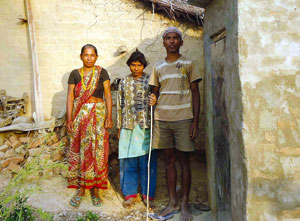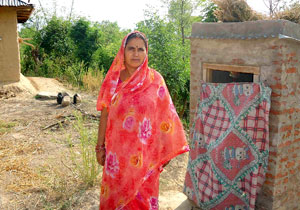 pics: ROBIN GIRI |
Having toilets or not makes the difference between life and death for tens of thousands of children in rural Nepal. Only 43 per cent of households in the country have latrines.
A simple gesture on the part of a village elder to help build a toilet for his poor and blind neighbour has now grown into a massive campaign in Dang that has helped build more than 2,300 household latrines in VDCs here.
The 'Aligning for Action to Make Diarrhoea History' campaign was launched in the aftermath of an outbreak of diarrhoea in this mid-western district in 2008 that claimed 88 lives. Health officials and the development community wanted to avert another epidemic that claimed the lives of mainly children under five.
Part of a multi-sector initiative to help prevent recurring outbreaks of diarrhoeal diseases in western Nepal, UNICEF and partners worked on a strategy that sought to solve the problems at the source, rather than treat the symptoms. Building on earlier successes of school and community-led campaigns on sanitation and hygiene, UNICEF and communities worked with school children, teachers and local leaders to hammer home the message that open defecation was killing their children.
 |
They set a target date by which every home should have a toilet. Then they issued the call for Danbirs or 'Heroes of Generosity' from within the community willing to donate material and resources to their poorer neighbours. At a grand community function, they pledged help while others volunteered labour.
"Most people are looking for charity from strangers, but they are embarrassed to accept charity from their own neighbours," says Hari Ghimire, chairperson of the Open Defecation Free campaign and Drinking Water committee.
Maya Devi (pic, right) and her family were one such example. When the Commandos told her about building a toilet, she replied that she couldn't afford it. "When I told my husband that we could get materials to build our toilet from our neighbours, my husband was embarrassed," she recounts. Out of pride, Maya Devi's husband and two sons bought used bricks and borrowed money to buy building material and built their toilet within a week. This simple strategy struck a chord with the community, and eventually it was only the poorest households like that of Dharma Das Chaudhary (pic, top right) who sought help from the Danbirs.
"I always wanted a toilet, but I couldn't afford it," says Chaudhary, a blind and unemployed former carpenter. "I am really thankful to the heroes of generosity in my village."
Saudiyar VDC is the first village in Dang district where all residents have a 'pukka' or permanent toilet. Just twenty years ago, there wasn't a single toilet in the village, and the community now knows that latrines save lives.
Read also:
Picking up the pieces after war, SUNIR PANDEY
A novel shelter is helping children orphaned and injured during the conflict to rebuild their lives
See also:
Learning from Jajarkot, OM PRASAD GAUTAM
Last year's diarrhea epidemic doesn't have to be a recurring nightmare


